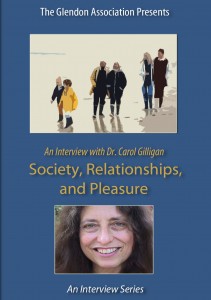Cultural Stereotypes of Men and Women
align=”left”
Carol Gilligan: So you know, these descriptions of boys as being not in relationship, or not emotional, I mean, they are as off as the description of girls as being, having no sense of self. And what’s amazing is that people actually repeat this, you know, that, “Women feel and men think.” Well, I mean, if they’d think about it for two minutes they’d realize that’s one of the more absurd things you could possibly say, because men also feel and women also think.
So why do people say that? I mean, it’s just really fascinating to me. You know, we say things that are really so stupid psychologically. “Men have minds and women have bodies,” that’s another absurd thing to say. Women have minds and men have bodies, so that’s when you see what goes on around gender and how it leads people into a kind of real stupidity. To say things which, if you thought about for two minutes, you wouldn’t say.
Lisa Firestone: It makes men and women out to be enemies in a lot of situations too which really ends up interfering in relationships.
CG: Not to mention how it, you know, [is] costing the world. But the other one is that, “Men have selves and women have relationships,” when, again, if you think about it for a minute, if you don’t have a self or a voice, you’re not in relationships, so you can’t have a relationship if you don’t have a way to express yourself, basically, because otherwise who is in the relationship? And it was wonderful hearing girls say that basically, I mean, it’s so obvious that they know it and then they…
Or, if you say men have a self but they don’t have relationships then you read, for example, the dedications of their books, you know, “I could never have written this book if not for my wife.” And, blah, blah, blah, and then you think, right, because there was this huge resonating chamber around this guy that [was] encouraging his voice and providing a lot of resonance for him and so, you know, but then, well it’s the same thing.
You divide human beings into these two incoherent huffs, and then you say that’s somehow the way men are and women are and it’s absolutely false for both. So that seems to me—that’s where I think psychology is crucial to this whole conversation about men and women because it’s been such a false conversation.
Order the Full DVD Interview:
 Society, Relationships and Pleasure
Society, Relationships and Pleasure
In this DVD, Dr. Carol Gilligan addresses a variety of topics including feminism, patriarchy, relationships, pleasure, parenting, and psychotherapy. She dispels myths regarding feminism that have pervaded both professional discourse and popular media for the past three decades, describing how “patriarchy creates a rift in the psyche, dividing everyone apart from themselves.” She discusses relationships and parenting, including the dynamics of mother-son and mother-daughter relationships. Finally, Dr. Gilligan addresses the dilemma of pleasure, stating that “pleasure is act one in a play that ends badly.” Emphasizing its importance, she describes how people often defend against pain by not feeling pleasure.










Leave a Reply
You must be logged in to post a comment.